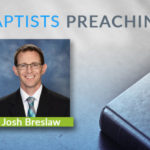DALLAS—In a season in which “democracy itself is being challenged,” Christians in the United States can learn from Jesus’ admonition to render to Caesar and to God that which belongs to each, the executive director of the Baptist Joint Committee for Religious Liberty told a Dallas church.
“We have both political obligations and spiritual ones,” Amanda Tyler said in a Sept. 25 sermon at Royal Lane Baptist Church in Dallas. “We do allegiance to our country. We also owe a higher allegiance to God.”
Those things that are rendered to one’s nation and to God are “distinct, different and to be separated,” she emphasized.
“If we confuse our political institutions with our religious institutions—if we merge them in our rhetoric and in our practice—if we cause one to try to control the other, then we start to replace our religion of Christianity with the political ideology of Christian nationalism,” Tyler said.
Political engagement not optional
American citizens have political obligations, such as paying taxes, obeying laws, supporting and defending the U.S. Constitution, being informed and participating in the democratic process, and respecting “the rights, beliefs and opinions of others,” she said.
“Our political engagement is not optional, and certainly not now, when our democracy is on life support,” Tyler said. “We have neither the luxury nor the permission to disengage right now.”
In particular, voting is both a precious privilege and duty of citizenship that should transcend partisan differences, she stressed.
“It is a tragedy that this cornerstone of American citizenship has been turned into a partisan wedge issue,” Tyler said.
While seeking to be responsible citizens, Christians should not confuse their obligations to the government with their duties to God, she emphasized. The Hebrew prophet Micah made clear what the Lord demands, she said: “Do justice, love kindness and walk humbly with God.”
Sign up for our weekly edition and get all our headlines in your inbox on Thursdays
As Christians fulfill their duty to God, those actions are “inextricably linked” to service toward others, she observed.
“We are to love our neighbors who look different from us, worship differently from us, who live in other neighborhoods than we do, who speak languages other than we do, and—yes—who vote differently than we do,” Tyler said.
Voting guides not a test of faith
She took to task Al Mohler, president of Southern Baptist Theological Seminary, for his recent comments at the Pray Vote Stand conference at First Baptist Church in Atlanta. Mohler said Christians who vote “wrongly”—particularly regarding issues of gender, sexuality and sanctity of life—are “unfaithful” to God.
“We need the right voters showing up with the right convictions at the right time to vote the right way,” Mohler told the group.
“It sounds to me like Dr. Mohler has his renderings really mixed up,” seeing voting a particular way as a duty to God rather than a civic obligation and creating a partisan faithfulness test, Tyler observed.
“Not only that, but what kind of pastoral advice is this—to divide congregations in what already is a denomination in rapid decline by using a voting guide to determine faithfulness?” she asked.
As an alternative, Tyler appealed to the teachings of the Apostle Paul in his letter to the Galatian church. Divisions in that church were real and deep, but Paul reminded them of their equality and commonality as children of God by faith in Jesus Christ, she noted.
While standing for truth and engaging in the political process, she urged Christians to avoid “vilifying and dehumanizing” their political opponents.
“We continue to see them as Jesus sees them and as Jesus sees us—imperfect and redeemed children of God,” Tyler said. “We refused to judge their faithfulness based on a voting guide. If God doesn’t do that, then why should we?”
She warned churches against functioning as political action committees rather than as houses of worship and faith communities.
Instead, quoting Martin Luther King Jr., she urged churches to be neither the servant nor master of government but to function as “the conscience of the state.”














We seek to connect God’s story and God’s people around the world. To learn more about God’s story, click here.
Send comments and feedback to Eric Black, our editor. For comments to be published, please specify “letter to the editor.” Maximum length for publication is 300 words.